Baths, Showers and Other Cleansing Methods
Moist Towelette Museum
Located inside Abrams Planetarium on the campus of Michigan State University. The curator of the museum is Planetarium employee John French who's been collecting towelettes since the 1990s.The crown jewel of the museum's collection seems to be the Star Trek towelettes.
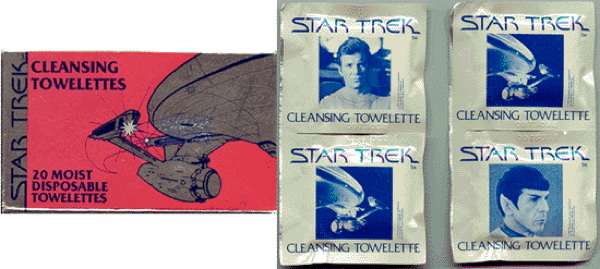
Other interesting towelettes include Mammo-wipes and Xerox typewriter waterless handcleaners.
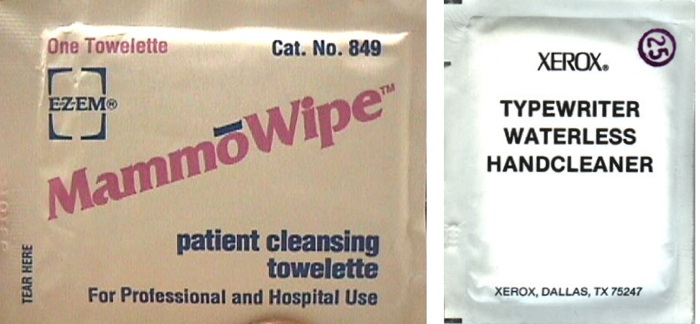
More info: Moist Towelette Museum
Posted By: Alex - Sat Apr 13, 2024 -
Comments (1)
Category: Museums, Baths, Showers and Other Cleansing Methods
True Towel Tales, No. 1
They're laying the beefcake on pretty thick to sell some towels.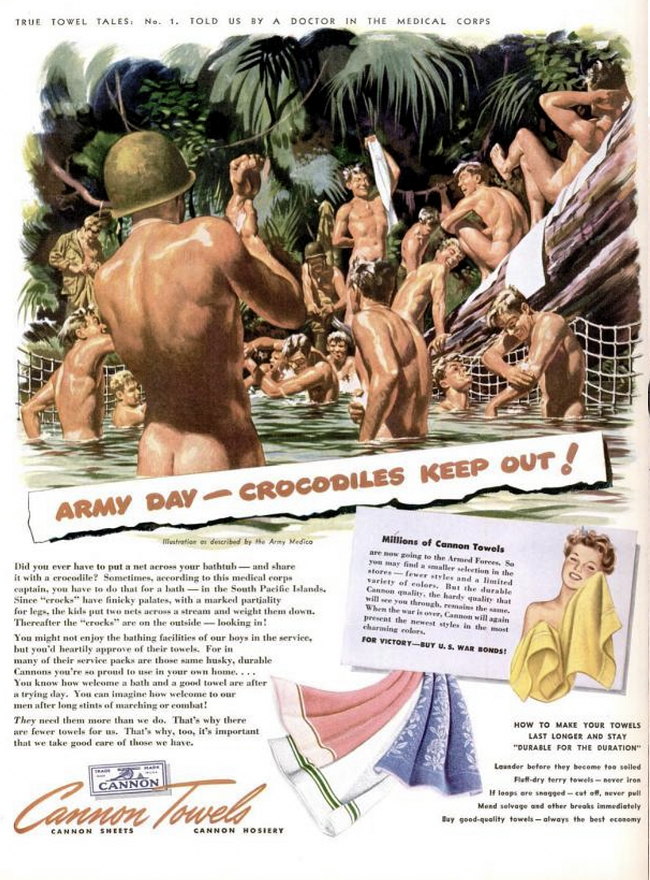
Posted By: Alex - Fri Feb 10, 2023 -
Comments (3)
Category: Advertising, Baths, Showers and Other Cleansing Methods, 1940s, Men
Jane’s skin didn’t pass the love test
Jane didn't use Lux Toilet Soap. So she was doomed to be forever alone.Previously posted: Lux ads about "undie odor" and gossiping underwear. During the 1930s and 40s, Lux Soap specialized in ads designed to terrify women into buying its products.
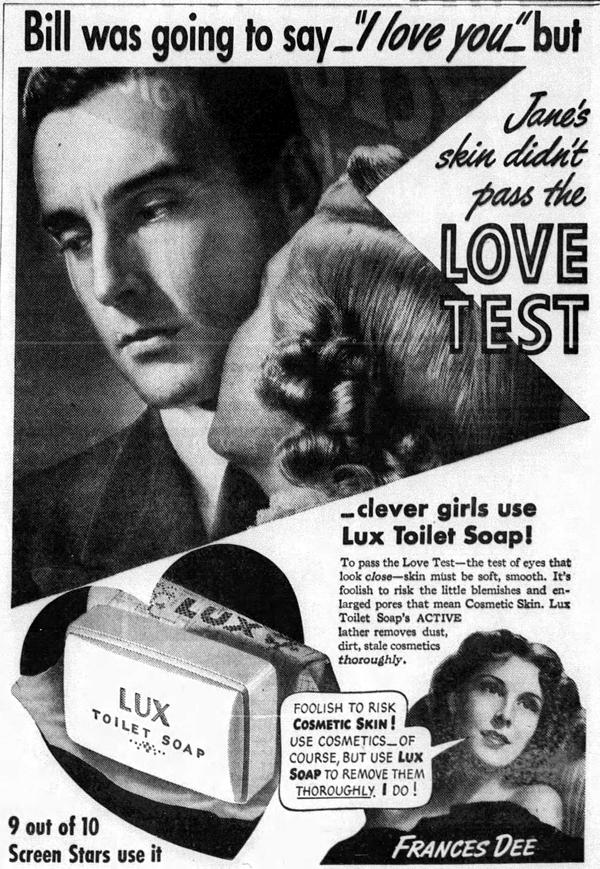
San Francisco Examiner - June 18, 1939
Posted By: Alex - Fri Oct 07, 2022 -
Comments (0)
Category: Advertising, Baths, Showers and Other Cleansing Methods, 1930s, Love & Romance
Knee-Cleaning Foam
They should sell this stuff at home improvement stores, because whenever I do a DIY project I somehow always end up with filthy knees.Available from Japan Trend Shop.
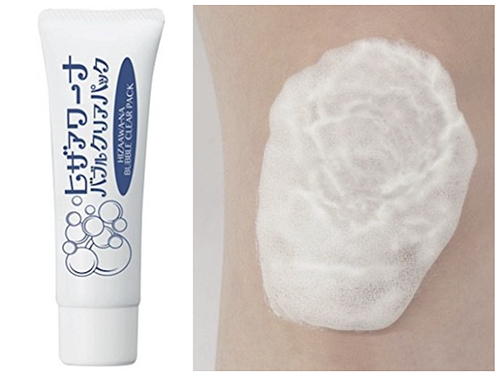
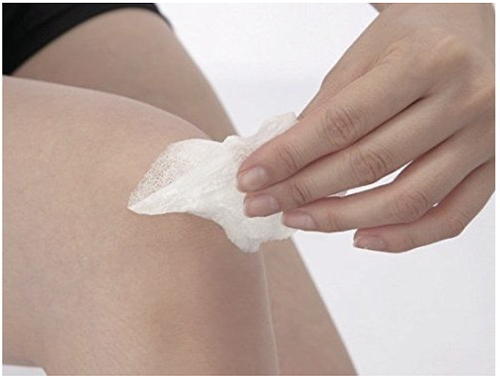
via Book of Joe
Posted By: Alex - Mon Aug 29, 2022 -
Comments (3)
Category: Hygiene, Baths, Showers and Other Cleansing Methods, Skin and Skin Conditions
Frances Gabe’s Self-Cleaning House
Frances Gabe had a vision of putting an end to housework. No more dusting or vacuuming. All a homeowner would have to do would be to push a button and the house would clean itself, as if the entire structure was a giant dishwasher.Of course, this meant that everything in the house had to be waterproofed. But it also meant that the actual dishwasher and clothes washer became redundant. Just hang dirty clothes in the closet and stack dishes in a cabinet — they'd get washed along with the rest of the house.
Gabe offered two stories for how she came up with the concept of the self-cleaning house. The first was that, as a newly married young woman, she once noticed a jam stain on the wall. Instead of scrubbing it off she decided to get a hose and sprayed it off.
The second story involved divine inspiration. After divorcing her husband she said that she was sitting, feeling despondent, and praying to God to provide her with some purpose to keep her going. Suddenly two angels appeared on her shoulders. And then, she said, "I picked up a pencil and began scribbling. I thought I was just doodling. Then I stopped and looked, and there was the self-cleaning house."
She received a patent (No. 4,428,085) for the self-cleaning house in 1984. She also transformed her own house in Newberg, Oregon into a prototype. From what I can gather, she never managed to make the entire house self-cleaning, but the kitchen could clean itself.
When she was alive she would offer tours of the house, but she died in 2016, and the new owners of the house haven't maintained its self-cleaning features.
Incidentally, Gabe was an invented name, so it's not what appears on her patent. Her full name, when married, was Frances Grace Arnholtz Bateson. She constructed 'Gabe' out of her initials.
More info: mit.edu, wikipedia
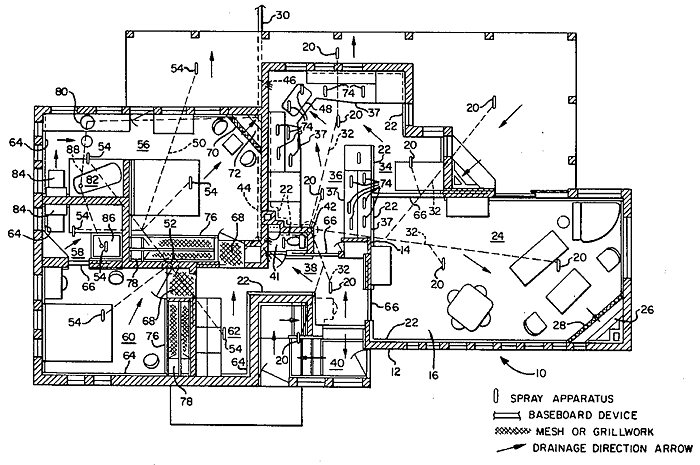
Posted By: Alex - Wed Feb 09, 2022 -
Comments (6)
Category: Architecture, Inventions, Patents, Baths, Showers and Other Cleansing Methods
A-Bomb Detergent
Wash away radioactive particles with Flobar!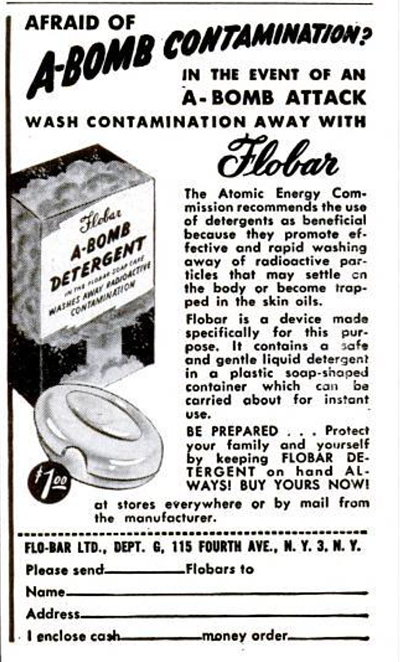
This ad later made its way into a 1982 piece by artist Winston Smith.
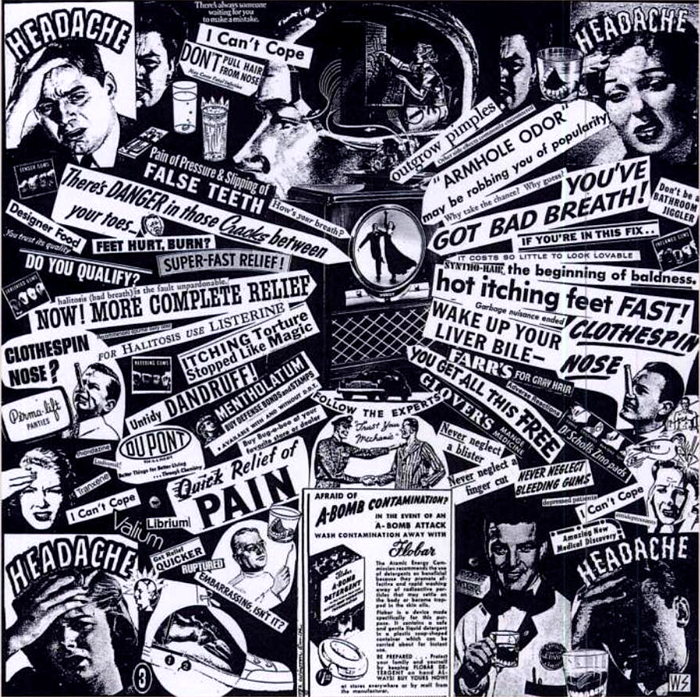
Posted By: Alex - Thu Apr 29, 2021 -
Comments (1)
Category: Advertising, Atomic Power and Other Nuclear Matters, Baths, Showers and Other Cleansing Methods, 1950s
Bathing Poncho
The bathing poncho, invented by Timothy and Brenda Reardon, allows someone to shower while clothed. From the patent:In institutions such as hospitals, nursing homes, college dormitories, gyms, and the like, the bathing or showering facilities often lack the privacy to which one is accustomed to at home. Thus, becoming unclad to take a shower or a bath can be somewhat of an unpleasant and embarrassing experience. A covering that would preserve one's dignity by minimizing exposure while also insuring a thorough cleansing would certainly be a welcome addition in the marketplace.
I can appreciate the problem this addresses, but I wouldn't want to be the kid who shows up in the locker room shower wearing one of these.
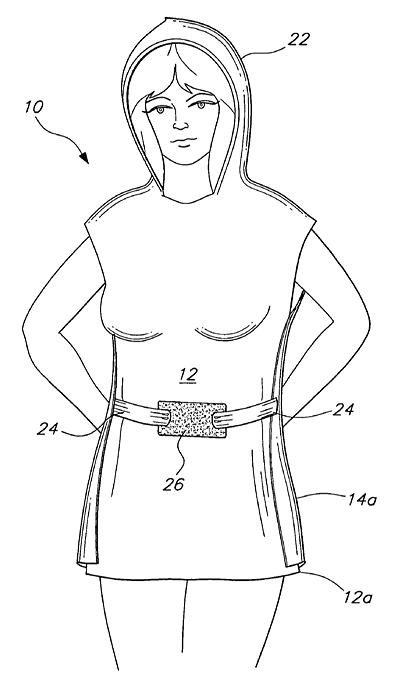
Posted By: Alex - Sun Feb 07, 2021 -
Comments (3)
Category: Fashion, Hygiene, Baths, Showers and Other Cleansing Methods, Inventions, Patents
Back Rub
Posted By: Paul - Tue Sep 08, 2020 -
Comments (0)
Category: Body, Hygiene, Baths, Showers and Other Cleansing Methods, Medicine, Music, 1950s
Hand Sanitizer Holster
Paula Russo was recently granted patent #10653232 for a "hand sanitizer holster," which seems like a timely invention for the age of covid, although she must have begun the patent process long before covid-19 was known.
Posted By: Alex - Sun Jun 07, 2020 -
Comments (6)
Category: Hygiene, Baths, Showers and Other Cleansing Methods, Inventions, Patents
Velvet-Lined Bathtub
Back in 1936, interior decorators predicted a popular future for velvet-lined bathtubs.I can only imagine they would have been a nightmare to clean.
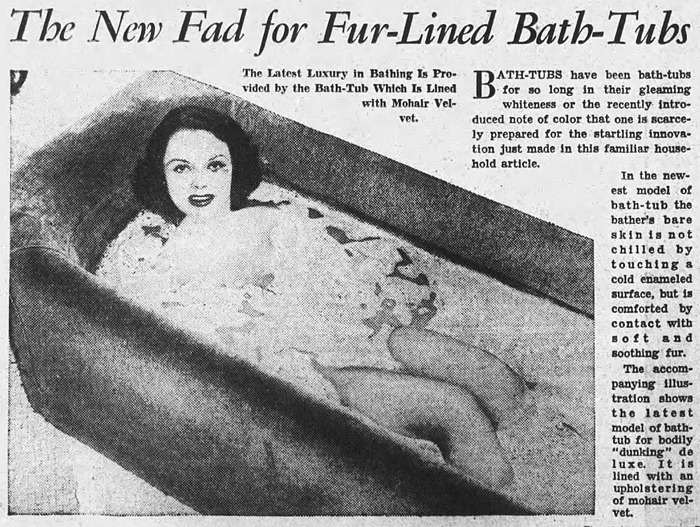
Pottsville Republican and Herald - Dec 4, 1936
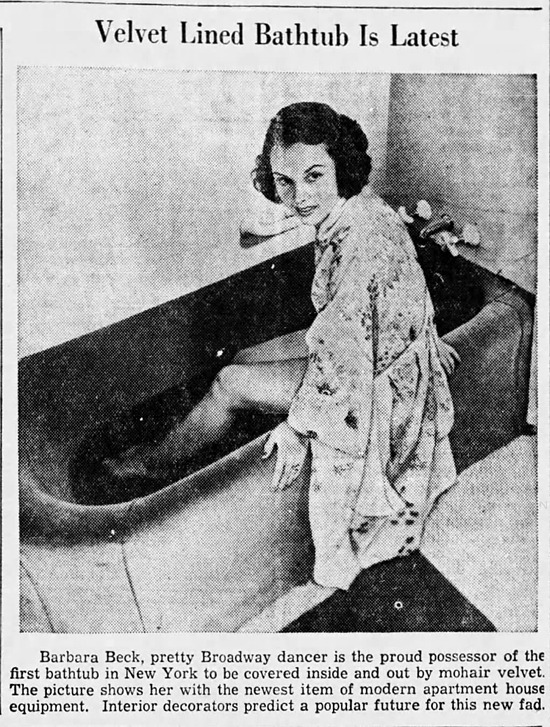
Emery County Progress - Nov 27, 1936
Update: Thanks to our knowledgeable readers, Floormaster Squeeze and KDP, for pointing out that Steve Martin had a line in one of his routines about buying a fur-lined sink. I found the clip on YouTube (audio only, unfortunately). The fur-lined sink reference occurs less than a minute in.
Posted By: Alex - Fri Sep 13, 2019 -
Comments (7)
Category: Bathrooms, Baths, Showers and Other Cleansing Methods, 1930s

| Who We Are |
|---|
| Alex Boese Alex is the creator and curator of the Museum of Hoaxes. He's also the author of various weird, non-fiction, science-themed books such as Elephants on Acid and Psychedelic Apes. Paul Di Filippo Paul has been paid to put weird ideas into fictional form for over thirty years, in his career as a noted science fiction writer. He has recently begun blogging on many curious topics with three fellow writers at The Inferior 4+1. Contact Us |




